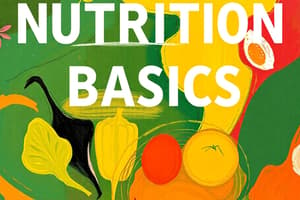Podcast
Questions and Answers
Who is the primary author of the book 'FQM 1212 Basics in Food Science'?
Who is the primary author of the book 'FQM 1212 Basics in Food Science'?
- Dr.P.M.H.D.Pathiraje
- Ms.N.K.S.Kithmini
- Prof.C.V.L.Jayasinghe (correct)
- Wayamba University of Sri Lanka
The ISBN number of 'FQM 1212 Basics in Food Science' is 978-624-5564-02-6.
The ISBN number of 'FQM 1212 Basics in Food Science' is 978-624-5564-02-6.
True (A)
What is the program title associated with the course FQM 1212?
What is the program title associated with the course FQM 1212?
B.Sc.
This publication is associated with the Faculty of __________.
This publication is associated with the Faculty of __________.
Match the following individuals with their roles in the publication:
Match the following individuals with their roles in the publication:
What does Food Science primarily study?
What does Food Science primarily study?
Food Science includes the study of food processing and storage.
Food Science includes the study of food processing and storage.
What is the primary importance of studying Food Science?
What is the primary importance of studying Food Science?
The scientific study of raw materials and their behavior during processing is called __________.
The scientific study of raw materials and their behavior during processing is called __________.
Match the following terms related to Food Science with their definitions:
Match the following terms related to Food Science with their definitions:
Flashcards are hidden until you start studying
Study Notes
Course Overview
- Course title: FQM 1212 – Basics in Food Science
- Offered by: Wayamba University of Sri Lanka, Faculty of Livestock, Fisheries & Nutrition
- ISBN: 978-624-5564-02-6
- Module includes learning outcomes, glossary of terms, and further reading recommendations.
Authors and Contributors
- Main Author: Prof. C.V.L. Jayasinghe, Chair of Food Science and Technology
- Assistant Author: Ms. N.K.S. Kithmini, Temporary Lecturer
- Editor: Dr. P.M.H.D. Pathiraje, Senior Lecturer
Introduction to Food Science
- Definition: Scientific study of raw materials and their physical, chemical, and biochemical behavior during formulation, processing, packaging, storage, and consumer evaluation of food products.
- Importance: Understanding food science is critical for quality control, product development, and addressing food safety concerns.
Water in Food Science
- Different types of water in food: Langmuir (monolayer) water, capillary water, and loosely bound water.
- Bound Water:
- Remains unfrozen at temperatures below 0°C.
- Unavailable as a solvent, important for food stability and behavior.
- Water activity (aw) affects water uptake in food materials.
Moisture Sorption Isotherms
- Illustrates the relationship between moisture content and water activity in foods.
- Critical for evaluating drying processes and predicting food stability, shelf life, and quality.
- Practical applications in storage, packaging, drying, and food preservation processes.
Applications of Starch in the Food Industry
- Starches and their derivatives play a vital role in maintaining the specificity and quality of food products.
- Common properties modified for improved performance include:
- Cooking characteristics
- Texture and viscosity control
- Solubility and paste stability
- Film formation and barrier properties
- Flavor release and emulsion stability
- Waxy maize starch preferred for its low gelling tendency at room temperature compared to unmodified corn starch.
Practical Insights
- Understanding moisture migration is essential for preventing spoilage and ensuring quality during processing and storage.
- Modified starches significantly impact the sensory and functional qualities of food products, enhancing consumer acceptance.
Contact Information
- E-mail for inquiries: [email protected]
Activities
- Recommended activity: Enumerate the importance of starches and their derivatives in maintaining food product specificity.
Studying That Suits You
Use AI to generate personalized quizzes and flashcards to suit your learning preferences.



